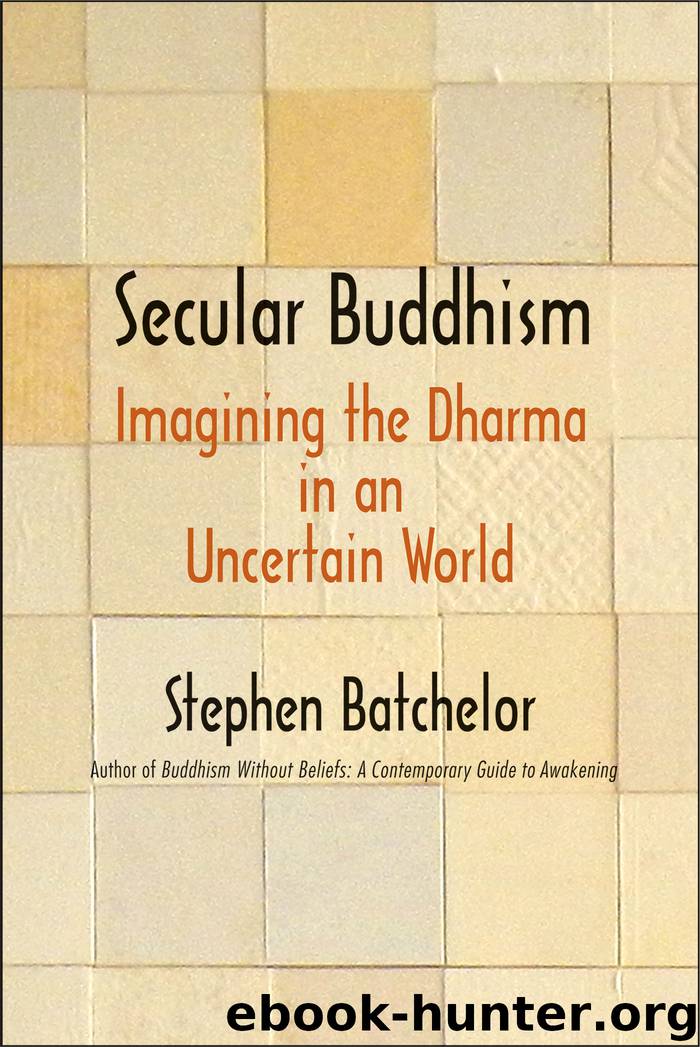Secular Buddhism by Stephen Batchelor

Author:Stephen Batchelor
Language: eng
Format: epub
Publisher: Yale University Press
Published: 2017-12-15T05:00:00+00:00
THE OTHER ENLIGHTENMENT PROJECT
A postmodern world that takes for granted the plurality and ambiguity of perception, the fragmented and contingent nature of reality, the elusive, indeterminate nature of self, the arbitrariness, inauthenticity, and anguish of human existence would seem to fit Buddhism like a glove. Yet this is nothing new. Western advocates of Buddhism, from Schopenhauer onward, have all tended to be impressed by the compatibility of its doctrines with their own way of seeing the world.1 Kantians saw the views of Kant in Buddhism, logical positivists those of Bertrand Russell, just as today deconstructionists behold the unravelings of Jacques Derrida. Within the last hundred years the teachings of the Buddha have confirmed the views of theosophists, fascists, environmentalists, and quantum physicists alike. Then is Buddhism just an exotic morass of incompatible ideas, a “Babylon of doctrines,” as the sixteenth-century missionary Matteo Ricci suspected? Or is this another illustration of the Buddha’s parable of the blind men who variously interpret an elephant as a pillar, a wall, a rope, or a tube depending on which bit of the animal’s anatomy they clutch? There may well be as many kinds of Buddhism as there are ways the Western mind has to apprehend it. In each case “Buddhism” denotes something else. But what is it really? The answer: nothing you can put your finger oṇ To fix the elephant in either time or space is to kill her. The elephant is both empty and perplexing. She breathes and moves—in ways no one can foresee.
This fluidity has enabled Buddhism throughout its history to cross cultural frontiers and adapt itself creatively to situations quite different from those in the lands of its origin on the Indian subcontinent. (The most striking example being that of its movement nearly two thousand years ago to China.) This creative process requires Buddhism to imagine itself as something different. It entails adopting compatible elements from the new host culture while at the same time critiquing elements of that culture that are at odds with its own Buddhist values. So it is hardly surprising that Buddhists today instinctively home in on elements of postmodernity that resonate with their own understanding of the dharma. The danger is that, for the sake of appearing “relevant,” they sacrifice the equally vital need to retain a lucid, critical perspective.
The element of postmodernity that potentially promises Buddhist voices access to contemporary culture is implicit in Jean-François Lyotard’s simplified but seminal definition of “postmodern” as “incredulity toward grand narratives.”2 The grandest of all these grand narratives for Lyotard and others is the European Enlightenment, the certainty of human progress through reason and science, which began in the eighteenth century. As soon as conviction in this myth wavers, a host of other assumptions are thrown into questioṇ Through focusing on change and uncertainty rather than on assured continuity, through emphasizing contingency, ambivalence, and plurality, postmodern thinkers have come to hear voices of the Other: those the Enlightenment Project has either suppressed, ignored, or disdained—women, citizens of the Third World, non-European systems of thought such as Buddhism.
Download
This site does not store any files on its server. We only index and link to content provided by other sites. Please contact the content providers to delete copyright contents if any and email us, we'll remove relevant links or contents immediately.
The Way of Zen by Alan W. Watts(6580)
Ego Is the Enemy by Ryan Holiday(5395)
The Art of Happiness by The Dalai Lama(4117)
The Book of Joy by Dalai Lama(3962)
Why Buddhism is True by Robert Wright(3436)
Spark Joy by Marie Kondo(3286)
Shift into Freedom by Loch Kelly(3187)
Happiness by Matthieu Ricard(3031)
A Monk's Guide to a Clean House and Mind by Shoukei Matsumoto(2897)
The Lost Art of Good Conversation by Sakyong Mipham(2637)
The Meaning of the Library by unknow(2553)
The Unfettered Mind: Writings from a Zen Master to a Master Swordsman by Takuan Soho(2289)
The Third Eye by T. Lobsang Rampa(2251)
Anthology by T J(2197)
Red Shambhala by Andrei Znamenski(2177)
The Diamond Cutter by Geshe Michael Roach(2055)
Thoughts Without A Thinker: Psychotherapy from a Buddhist Perspective by Epstein Mark(2003)
Twilight of Idols and Anti-Christ by Friedrich Nietzsche(1885)
Advice Not Given by Mark Epstein(1871)
